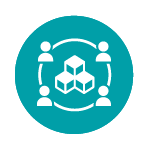Establishment of "SECOM AI Ethics Principles"
SECOM Co., Ltd. (Headquarters: Shibuya, Tokyo; President: Ichiro Ozeki) has established the "SECOM AI Ethics Principles," recognizing that the proper utilization of AI is essential as AI-driven services and systems continue to spread throughout society. SECOM is the first security service provider in Japan to institute these principles, providing guidelines on the use of AI to ensure that customers can confidently choose and use SECOM's services.

SECOM was the first in the world to commercialize image sensors with advanced image recognition technology in 1998. In keeping to its roots of constant innovation and adopting new technology, SECOM has been actively involved in AI research and development, employing AI in security services.
Currently, SECOM utilizes AI in various ways, such as in the sensing technology and autonomous control of the "Virtual KEIBI System*1" and the security robot "cocobo*2," as well as in providing suggestions for arming/disarming the SECOM Home Security based on location data*3 and in determining the rhythm of everyday life routines in the monitoring services*4.
SECOM will continue to pursue the application of AI for people's peace of mind and a better society, based on the SECOM AI Ethics Principles.
■ SECOM AI Ethics Principles: https://www.secom.co.jp/corporate/development/secomAI.html
- *1: Press Release (January 13, 2022) World's first virtual character utilizing AI for security and reception tasks launched - "Virtual KEIBI System" https://www.secom.co.jp/corporate/release/2021/nr_20220113.html
- *2: Press Release (January 17, 2022) Security robot "cocobo" for sale, featuring flexibility to meet various needs and harmony with public spaces, using AI & 5G https://www.secom.co.jp/english/news/2022/nr_20220117.html
- *3: Press Release (February 1, 2022) More comfortable operation of "SECOM Home Security" with "Apple Watch" or "iPhone" through "SECOM Cantabile" app https://www.secom.co.jp/corporate/release/2021/nr_20220201.html
- *4: Press Release (December 10, 2019) SECOM and IoT venture company chikaku inc. begin offering "Magochannel with SECOM" https://www.secom.co.jp/corporate/release/2019/nr_20191210_2.html
SECOM AI Ethics Principles
SECOM's Approach to AI
SECOM is committed to pursuing sustainable growth and contributing to the happier lives of stakeholders, including customers and employees. From early on, SECOM has engaged in research and development towards AI, applying it in areas like image recognition and robotics within security services.
As AI-driven services and systems increasingly become part of our infrastructure and deepen their interaction with people, the ethical, legal, and social issues associated with AI become apparent. SECOM believes that a responsible approach is necessary to further contribute to society through the development of security services.
To provide peace of mind and to realize a better society, SECOM has established the SECOM AI Ethics Principles as a set of guidelines for AI usage, and through communication with stakeholders, continues to pursue the application of AI.
SECOM AI Ethics Principles
The SECOM AI Ethics Principles have been established as a set of guidelines for all SECOM officers and employees when utilizing AI.

1. Fairness, Accountability, Transparency:
SECOM will judge the use of AI based on basic philosophy whether it is right or fair for society, aiming for fair AI utilization and ensuring transparency and accountability by providing appropriate information to customers.

2. Human-Centric:
SECOM will position AI as a basis for supporting the vibrant, valuable lives of everyone, respecting human dignity while aiming to continue offering trusted security via AI.

3. Privacy Protection:
SECOM will rigorously handle stakeholders' personal information and strive to protect their rights, including the right to privacy, in AI applications.

4. Safety Assurance:
SECOM will prioritize stakeholders' safety above anything else, focusing on the areas where value offering of AI is deemed appropriate. SECOM will aim to build a framework where capable personnel who understand the characteristics of AI can assess the safety, reliability, and security of AI-driven value offerings.

5. AI Literacy & Human Resource Development:
SECOM will strive for proper AI comprehension, fostering the growth of talented personnel who contribute to AI use, while aiming to create a comfortable and convenient society with safety and peace of mind, and with an appropriate understanding of AI's characteristics and risks.

6. Innovation & Collaboration:
SECOM will use AI to create a better society. To manifest the personal and societal values of the future, SECOM will continuously pursue AI utilization and development through co-creation with stakeholders, including customers and partners.
■ Supplementary Provisions
- AI utilization at SECOM refers to the provision of AI-driven products and services and its use in various business operations including research and development.
- Reflecting the accumulation of AI use cases, changes in social environment and lifestyle, societal discussions, and dialogue with stakeholders, SECOM will review these principles as needed, contributing to the understanding and dissemination of AI and societal development.
Date of Ratification: October 20, 2022
